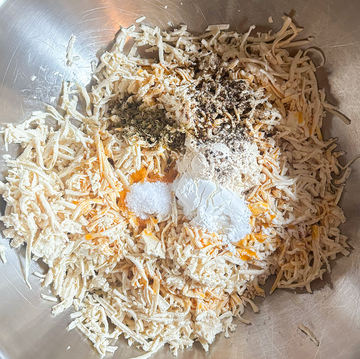75, 75, 75. Christina Rice was ruled by that number. She didn't feel right unless she hit that magic target — 75 minutes of exercise — at least six days a week. Working out was the only thing that relieved the anxiety she felt as a student at UCLA, and it was a healthy way to manage her stress. Until it started to take over her life.
"I clung to that workout every day," the Addicted To Lovely blogger explained. "I needed it to feel better. It turned into working out longer and harder every day, and it spiraled out of control."
Around that time, Rice got into clean eating, a movement based on eating whole, minimally processed foods. She'd been having digestive issues, and after reading horror stories about the dangers of sugar, carbs, and fat online, she started restricting her diet to focus only on the cleanest, "purest" foods. The 23-year-old cut out all sweets, fruit, starches, and most fats. Without intending to, Rice started losing weight at a dramatic pace, dropping 40 pounds in less than three months.
Eventually, Rice realized she struggled with exercise addiction and orthorexia — an obsession with healthy eating to the point that it becomes unhealthy. It was a long journey to that realization, though. First, because the latter isn't officially considered a disorder in the Diagnostic and Statistical Manual of Mental Disorders, the guide professionals use to diagnose mental illnesses, she couldn't be diagnosed with it.
Second, to the outside world, Rice's diet and exercise routine sounded like a body-transformation success story — at least on paper. One woman committed to working out more and eating healthier, cleared up her stomach problems, and lost weight! In fact, when Rice initially shared her exercise plan with her doctor, she was told everything looked fine. What's wrong with working out for an hour and 15 minutes a day? But deep down, Rice knew something was very, very wrong.
It Totally Consumed Her.
"I wouldn't hang out with friends, because they wanted to hang out during a time when I wanted to work out, or they wanted to eat at a place that didn't fit my dietary needs," she said. "I felt like such a nuisance when I'd go to visit [my parents at] home. I was so stressed out: What time were we going to eat? What were we going to eat? What time could I work out? Everything was just revolving around that."
Rice searched online for answers and started meeting with doctors and nutritionists — she estimates she saw 15 dietitians alone — hoping that someone could explain why she felt the way she did. At first, experts brushed it off. She wasn't trying to lose weight, nor was she actively concerned about her weight; she just really liked to work out and eat healthy. Nothing wrong with that, it seemed.
It wasn't until her weight had dropped to 73 pounds that people started to question just how health-obsessed she'd gotten. Finally, a nutritionist sat her down and delivered a harsh truth. "'You could have a heart attack and die at any second,'" Rice recalled. "When she said that to me, it hit me like a ton of bricks. No one had ever been that direct with me before."
Her body fat percentage was about 6.8 percent, Rice said, well below the minimum of 10 percent the American Council on Exercise suggests a woman should have. And far from the 25 to 30 percent considered average. Rice was so thin that it was putting undue strain on her organs, her nutritionist explained.
It Was More Than A Wake-Up Call.
It was a confirmation of Rice's fear: Something wasn't right here. She pushed back at first, particularly when the nutritionist told her she needed to stop working out, but soon agreed. With the help of a psychologist, too, they created a plan to help her understand what compelled her clean-eating obsession — and reframe her mindset of what it means to be 'healthy.'
"What they taught me to do was do what I was afraid of. I had to stop working out. I had to eat foods I was afraid to eat," Rice explained. "I had to prove to myself that nothing horrible was going to happen when I did those things."
She took baby steps: cooking with oil — at first, only a drop with her sauteed veggies — eating half a banana in her morning smoothie, skipping that hour-and-15-minute workout. She started meditating and writing in a journal, chronicling how she felt.
"I had read 'this food is going to do X, Y, and Z to your body,' and I got it in my head that that food was evil, and so I was afraid of it," Rice said. "I've come to a place where every single food somebody says, nowadays, that there's something bad about it. And there's somebody else who's saying there's something great about it. You just have to tune into yourself and eat what works for you."
In an era when anybody is a few keyboard strokes from sharing whatever they believe online, where Instagrammers can become health gurus with the power of a strong hashtag and smoothie bowl game, it can be hard to know what to believe. Compound that with Rice's fear that her digestive issues would return, should she change her diet at all — a common concern for many who struggle with orthorexia, who often turn to clean eating as a way to relieve their symptoms — and it's easy to see why relaxing her definition of 'healthy' was so difficult.
Rice's nutritionist wrote out meal plans for her, reintroducing complex carbs (like Paleo bread) and healthy fats into her diet. "I clung to this piece of paper, because this was like my prescription," she explained, gripping the two-year-old handwritten note.
With each new food, she'd jot down her fears — and how she felt afterward. "I'd ask myself, 'What's the worst thing that could happen if I did this? If I didn't work out for three months? Gain weight, which is what I need to do," Rice said. "When you realize that, you realize so much of this is a mental block in your head. It's empowering."
These days, Rice follows a whole foods-based, Paleo diet, based on the plan she set up with her nutritionist. She's learned her body doesn't process gluten well (hence those digestive issues), and she no longer feels the need to exercise every day to feel 'clean.' The experience inspired her to become a nutritional therapy practitioner.
"I just want to show other women that there's always something to fight for, and there's always somebody in your corner, and that you're not alone," she said. "I want to be the person I was searching for, for someone else."
If you or someone you know may be suffering from orthorexia, exercise addiction, or an eating disorder, contact the National Eating Disorders Association at 1-800-931-2237 or visit nationaleatingdisorders.org for help.
Follow Delish on Instagram.
Download the Delish app.
















